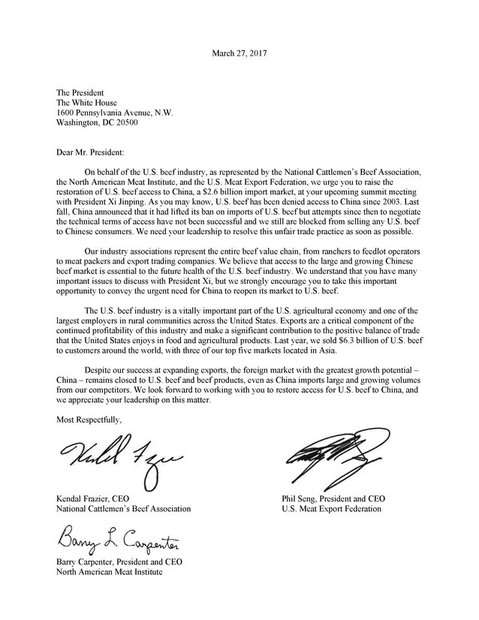Asking for restored market access to China
By Diego Flammini
Assistant Editor, North American Content
Farms.com
Members of the U.S. beef industry have penned a joint letter to President Trump, urging him to restore market access to China during his upcoming summit with Chinese President Xi Jinping.
The letter, signed by Kendal Frazier, CEO, National Cattlemen’s Beef Association, Phil Seng, president and CEO, U.S. Meat Export Federation and Barry Carpenter, president and CEO, North American Meat Institute, says China is a $2.6 billion import market that the United States needs entry into.
“We understand that you have many important issues to discuss with President Xi, but we strongly encourage you to take this important opportunity to convey the urgent need for China to reopen its market to U.S. beef,” the letter states. “The U.S. beef industry is a vitally important part of the U.S. agricultural economy...
“Last year we sold $6.3 billion of U.S. beef to customers around the world, with three of our top five markets located in Asia.”

Locked out since 2003
In December 2003, a cow in Washington state tested positive for bovine spongiform encephalopathy (BSE), commonly known as mad cow disease.
At the time, China was importing around $10 million worth of beef from the U.S.
Upon confirmation of the disease, China banned all beef imports from the United States. The ban was finally lifted in September 2016.
The lifting of the ban was a critical step to restoring access for U.S. beef, former USDA Secretary Tom Vilsack said.
But according to the March 2017 letter, negotiations haven’t proceeded.
“…attempts since then to negotiate the technical terms of access have not been successful and we still are blocked from selling any U.S. beef to Chinese customers,” the letter states.
China lifts Brazilian ban
China recently lifted its ban on Brazilian beef imports after an investigation accused health inspectors of taking bribes to ignore violations.
Brazil informed China it would suspend the export of products from the involved companies and take extra security measures, Hua Chunying, a Chinese foreign ministry spokeswoman, told the Associated Press.
According to the Brazilian Beef Exporters Association, Brazil exported more than $700 million worth of beef to China between January and December 2016.
Farms.com has reached out to beef producers across the United States for comments on how regaining market access can help the beef industry.